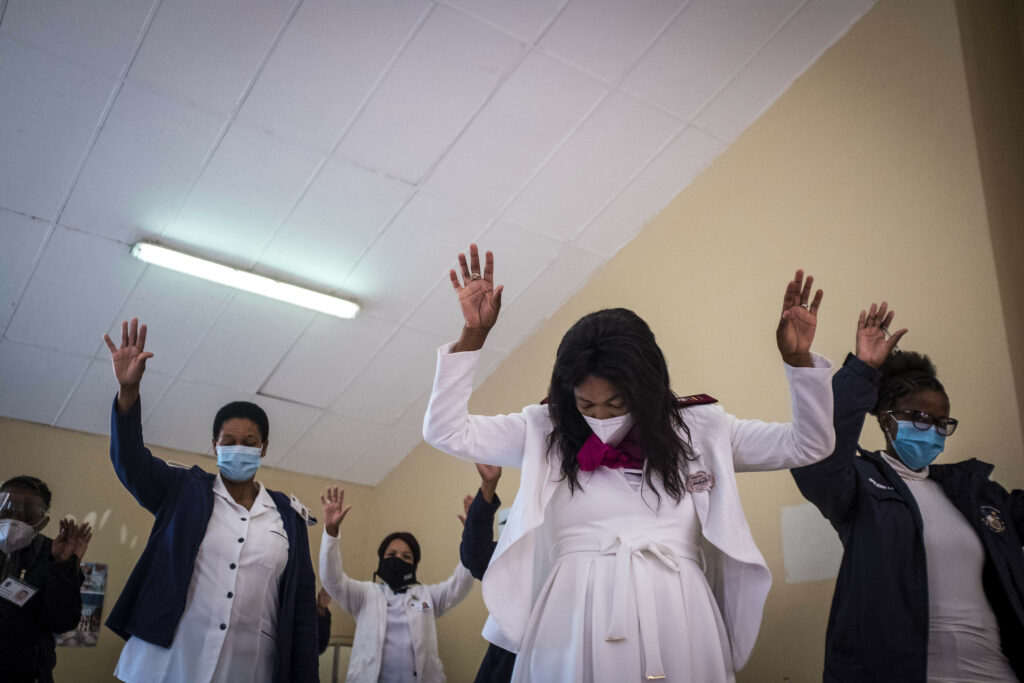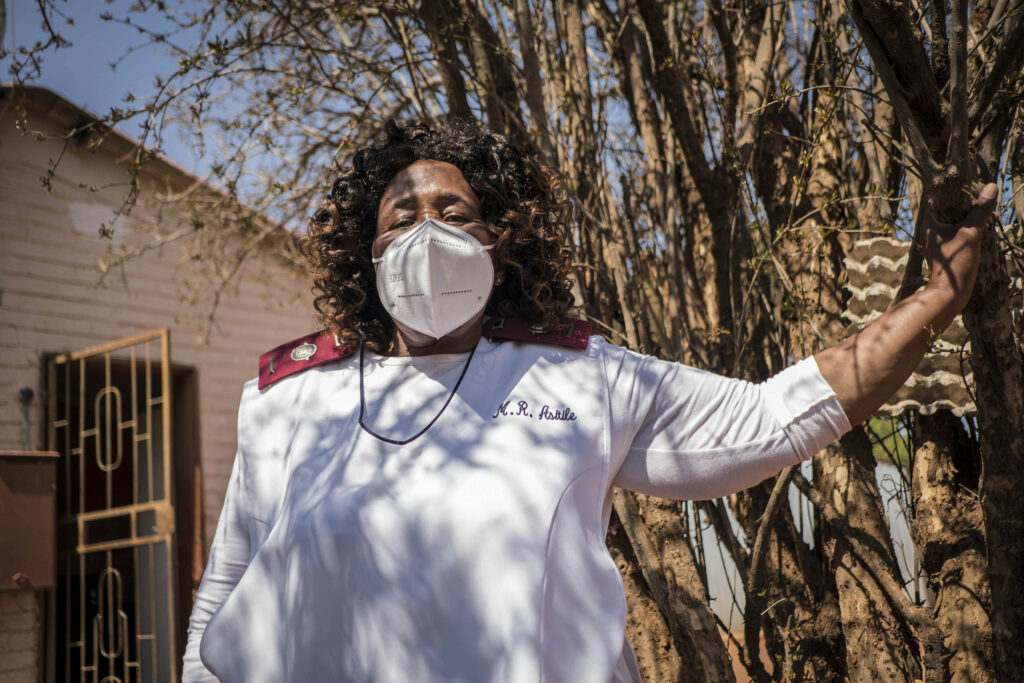At work: Gontlafetse Leinane (45) sprays hand sanitiser on community healthcare workers in Pudumong. (Photos: Gulshan Khan)
The focus may have been on urban nurses during the Covid-19 pandemic, but those in rural areas suffer similar fates. However, very little is known about how they have been able to cope with colleagues falling sick, their lack of PPE and simply how they’ve coped with the fear and anxiety of being on the front line. Kim Harrisberg & Gulshan Khan from the Thomson Reuters Foundation report.
Ruth Seikaneng did not have time to mourn her nursing colleague Dudu who died from Covid-19 in one quick, painful week in July. In the village of Reivilo in the North West province where Seikaneng works, patients were waiting for diagnoses, personal protective equipment (PPE) had to be ordered, and a full week of 12-hour shifts lay ahead.
“We miss Dudu. That loss, it was so bad. But we had to come straight back to work to make sure no one else got sick,” said Seikaneng in between consultations.
Seikaneng, 64, is one of 11 nurses in the town fighting the spread of Covid-19. More than 17 000 people have died from Covid-19 in the country to date.
Seikaneng’s experience in this former mining town of about 4 000 inhabitants echoed that of nurses who have spoken out around the country, with protests erupting over salaries and PPE and staff shortages.
 Ruth Seikaneng is one of 11 nurses in Reivil.
Ruth Seikaneng is one of 11 nurses in Reivil.
According to the World Health Organisation (WHO), there are about 28-million nurses in the global workforce with a shortage of nearly 6-million — 90% of these shortages are found in low and middle income countries like South Africa.
“We are doing the best we can with the little we have,” she told the Thomson Reuters Foundation from an office in the Reivilo Health Centre where she works.
This meant carefully assessing symptoms to know whether to call for an ambulance from the nearest hospital 70km away where testing kits were found, working longer hours when a colleague has to quarantine, or using outdoor areas to isolate patients.
On some days, PPE was not delivered and the 11 nurses who serve the town have had to re-use masks or go without.
Often their priority was simply stabilising patients until the ambulance arrived to take them to Taung Community Hospital with the only Covid-19 ward in the local municipality of about 200 000 people.
Vicky Shikwambana, the hospital’s Covid-19 ward manager, awaits the patients’ arrivals from surrounding towns such as Reivilo, before sorting them into the rooms for either suspected or confirmed coronavirus cases.
If the patients’ conditions worsen, they need to be transported again, this time to Klerksdorp Hospital some 250 km away.
“We only have one ventilator in the whole hospital. What can we do? We have to keep working because this is a pandemic,” said Shikwambana as he walked to the storage room where PPE sat safely in boxes. He said he had enough PPE to last a weekend.
Like many nurses around the world, when Covid-19 hit Shikwambana had to pivot his role to fill in the service gaps.
The tuberculosis (TB) ward was quickly turned into a coronavirus unit, with TB patients moved elsewhere in the hospital.
“My family is nervous about me working here, but they are also proud,” said Shikwambana, standing outside the building where patients are being monitored.
To avoid donning precious PPE, Shikwambana and the other nurses sometimes speak to the patients through the window, another small improvisation that he said helps ration resources.
Aware of the nurses’ struggles, Kedibone Mdolo, the North West acting provincial secretary of the Democratic Nursing Organisation of South Africa (Denosa), paid a visit to check in with her colleagues at Taung Hospital.
Upon her arrival, Denosa members organised a day to celebrate the WHO’s declaration of 2020 as the Year of the Nurse and Midwife.
Candles were lit to honour the nurses putting their lives on the line fighting the virus, including Dudu — the only nurse to die from the virus in the local municipality. Prayers and songs swept through the room as nurses rose to their feet, raised their hands and bowed their heads in prayer.
 A prayer meeting at Taung Hospital.
A prayer meeting at Taung Hospital.
“Each and every day, you put on your uniform and take care of your patients,” said Mdolo, wearing her starched white nursing dress and a red scarf draped around her neck.
Alongside the flickering flames of the red, yellow and white candles, the Denosa colours, Mdolo addressed her fellow nurses.
“You are the light, especially in this time of Covid. When people are dying from loneliness in the wards, nurses are there by their side.”
In Pudumong, another village about 18km north of Taung Hospital, a group of community healthcare workers gathered outside the clinic, adjusting hats in the glaring sun.
“We are here to save our community,” said Kgomotso Moremedi, a 43-year-old healthcare worker who is one of 26 members of an outreach team going door-to-door conducting contact tracing to monitor and mitigate the virus spread.
Gontlafetse Leinane, 45, sprayed the last few millimetres of hand sanitiser into her fellow healthcare workers’ hands. They rubbed the sanitiser into their palms and between their fingers and adjusted their masks before they began their walk.
“This is all the sanitiser we have today,” she laments. “Some days we just have to wash our hands with water.”
The mainly female team of healthcare workers was previously trained to conduct door-to-door check ups and assessments of TB and HIV patients in the village.
When Covid-19 hit, Pudumong’s healthcare workers quickly became Covid-19 tracers under the supervision of the clinic’s nurses.
They are paid R3 500 per month, a salary the healthcare workers say is low, but better than nothing.
With no thermometer, they have used a verbal assessment form to ask quarantining residents how they feel, who they last saw and whether their symptoms are better or worse.
At their first stop, nurse and team manager Rachel Asitile accompanied three outreach team members to the house of Thuso Kalanyane, a 49-year-old teacher and Covid-positive patient who was on day seven of his quarantine.
 Sister Rachel Asitile outside the home of a person who tested positive for Covid-19 in Pudumong.
Sister Rachel Asitile outside the home of a person who tested positive for Covid-19 in Pudumong.
“I am feeling much better, but there was a point when I was so pessimistic,” said Kalanyane from his doorway where he stood at a distance.
“We are relieved and happy to see the healthcare workers,” said his wife Mapuledi, who had also been isolating since she found out her husband was positive.
“We have been waiting for them. Now we feel that someone is there for us, that we are not alone in this,” she said.
Back at the clinic, Asitile checked in with the different team members to find out how all the assessments went. A mobile testing station was docked outside the clinic.
Dineo Moletsane, 33, had bought her 76-year-old mother Gladys to get tested after she woke up with an aggressive cough.
“I really hope she does not have this virus. I have heard people her age do not make it. On top of this, there are 10 of us living together in our house. How will we isolate?”
Moletsane said, anxiously watching her mother as she opened her mouth for the test swab.
Asitile was acutely aware of the climate of fear and uncertainty in the South African village not far from the border with Botswana. She saw it as her job to learn to manage the unknowns within her team and her community, as best as she could.
“We cannot be afraid or it will affect us psychologically. All we can do is try by all means to protect ourselves and others,” said Asitile, adding that when funds were low she financed sanitisers and assessment form photocopies herself. “I am very proud of the team,” she said. “We are all still learning but they are assets to our health department. These ladies, they are workers.”
This story was first published by the Thomson Reuters Foundation as part of a series of photo essays in partnership with Nurse Heroes honouring nurses around the world.